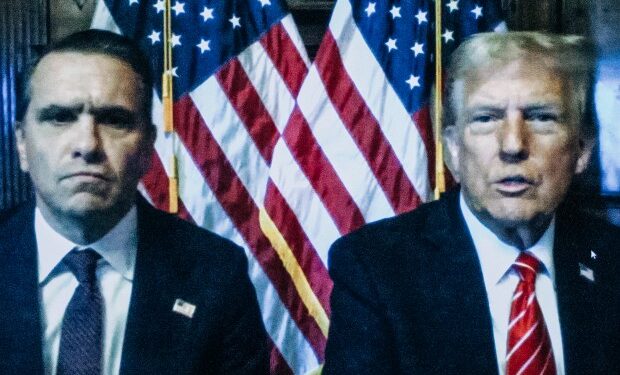President-elect Donald Trump was sentenced Friday morning for falsifying business records in a scheme to defraud voters in 2016, marking an official end to the explosive case that involved hush money payments to a porn star and formally making Trump a convicted felon 10 days before his return to the White House.
Manhattan Supreme Court Justice Juan Merchan imposed a sentence of an unconditional discharge, capping the historic case filed in spring 2023 without punishment for the former and soon-to-be president. Trump had faced the possibility of jail time, though that option became moot with his election in November.
Trump appeared remotely for the 15th-floor proceeding in lower Manhattan’s 100 Centre St., where scores of reporters were lined up in chilly temperatures as early as 5 a.m. to mark the historic day.

Imposing sentence, Merchan said the lenient term was a legal mandate and that “Donald Trump the ordinary citizen – Donald Trump the criminal defendant – would not be entitled to such considerable protections.”
The president-elect mounted a furious effort to dodge the sentencing, targeting delay bids at four courts. The Supreme Court had the last say in an order late Thursday, sounding unpersuaded by his claim the hearing would unduly burden his presidential transition.
“Today’s event was a despicable charade, and now that it is over, we will appeal this Hoax, which has no merit, and restore the trust of Americans in our once great System of Justice,” Trump posted on Truth Social, shortly after the proceeding concluded.
While the significance of the sentencing is mainly symbolic, it brings closure to the case and formally classifies Trump as the first U.S. president in the nation’s history to become a felon. He has said he plans to appeal.

The criminal case centered on Trump’s coverup of payments to Michael Cohen that reimbursed his longtime fixer for silencing porn star Stormy Daniels in the lead-up to the 2016 election. The porn actor has long claimed she had a sordid encounter with Trump in a Lake Tahoe hotel room in 2006, which he denies.
Jurors heard over the more than monthlong trial that Cohen, Trump, and tabloid publisher David Pecker devised the scheme to control what voters knew about Trump’s past in August 2015. Former Playboy model Karen McDougal and a doorman at Trump Tower also received payoffs to suppress their allegations of Trump’s sexual exploits.
The Manhattan jury who decided the case found Trump guilty of 34 felony counts of falsifying business records on May 30, for which he was supposed to be sentenced on July 11. His lawyers convinced the judge to postpone it three times.

Trump was placed under a gag order at the trial, which is expected to expire Friday, after he spread unfounded conspiracies about Merchan’s daughter online, leading to death threats. The order barred him from discussing prosecutors, court staff, and their families but not the judge or Manhattan District Attorney Alvin Bragg, who brought the case.
He has repeatedly chided Merchan in posts on his Truth Social account, grievances casting himself as a victim of political persecution, a weaponized justice system, and racism against white people by Black prosecutors.
But Trump’s experience of being found guilty of felonies without consequence is unique. Facing the prospect of four years in prison on the charges seven months ago, he will instead spend them in the White House.
Bragg’s case was the only one of four brought against Trump after his first term that went before a jury.

Federal prosecutors recently moved to dismiss two actions accusing Trump of plotting to overthrow President Biden’s win in 2020 and hoarding classified documents at his country clubs after leaving office.
Through his second term, he will be protected from the Georgia state case concerning his alleged election subversion efforts.
This story will be updated.
Originally Published:






